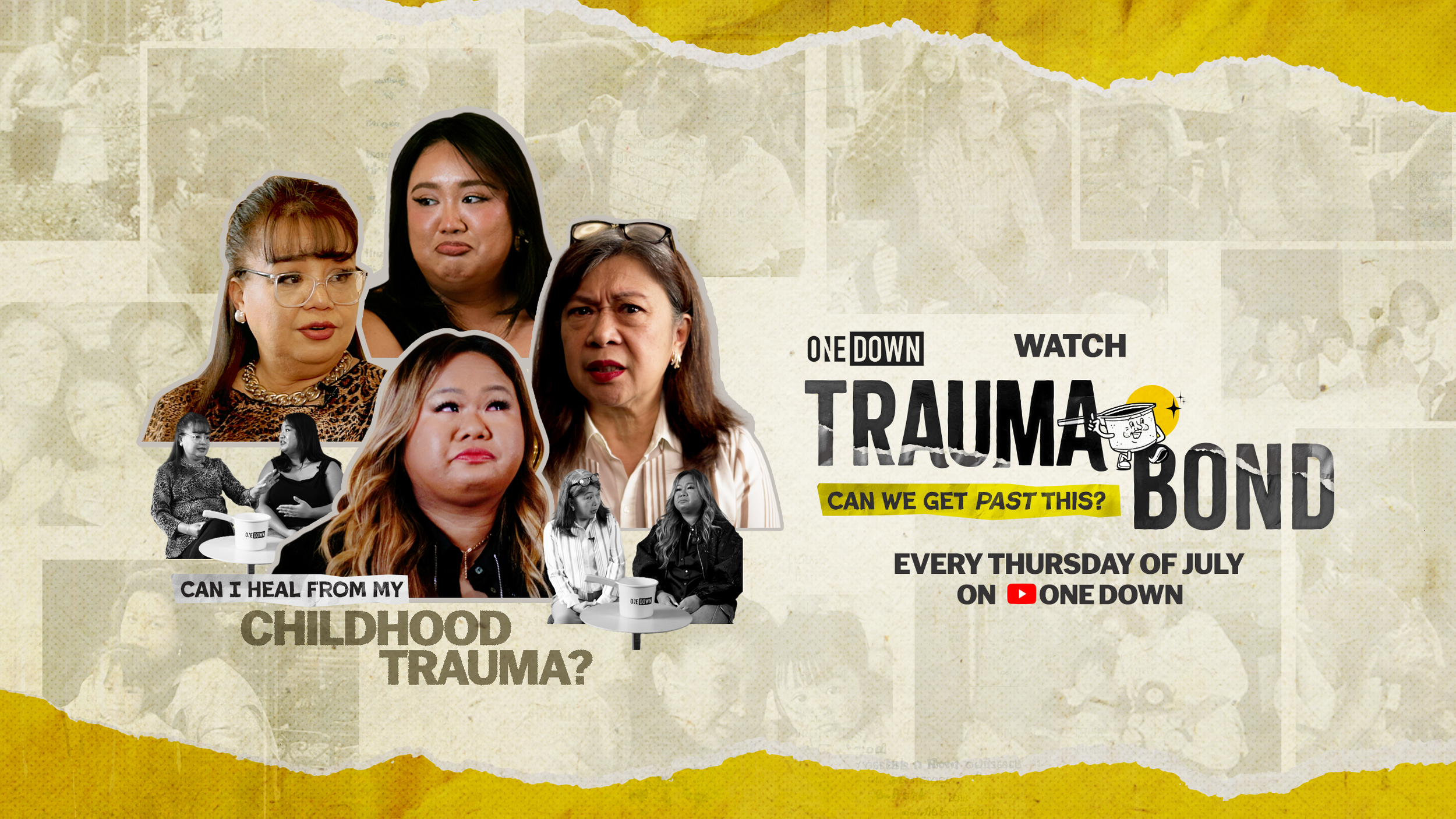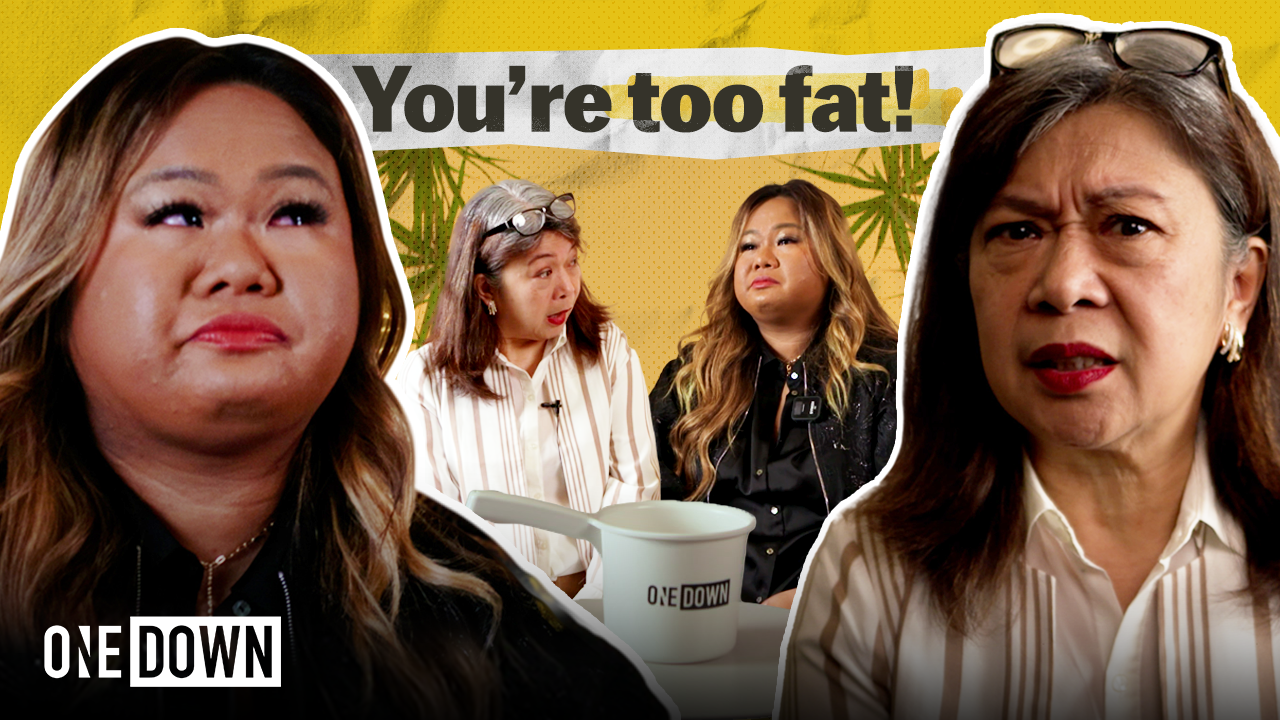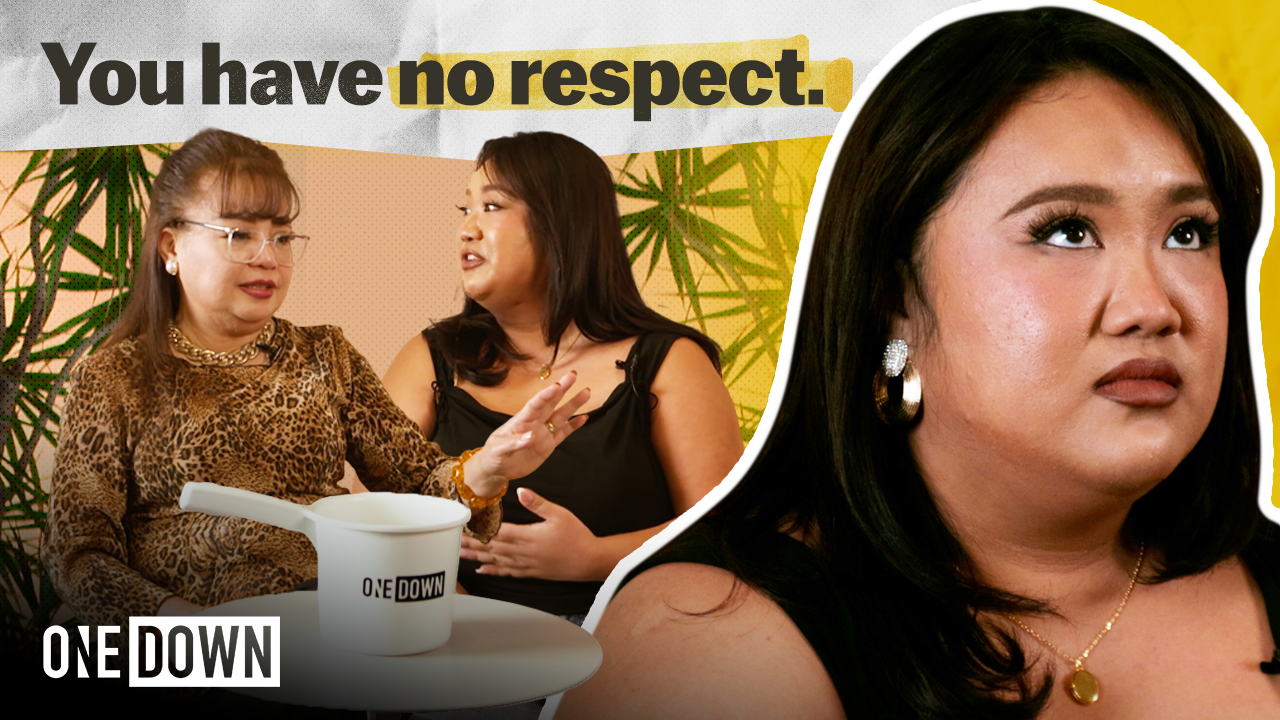Trauma Bond: Addressing Generational Trauma Through Tabo(o) Topics
Trauma Bond: Can We Get Past This? Photo: One Down Media
Communication is the root of truth and understanding. Without it, relationships have the potential to fall into a deep and oftentimes inescapable void that is vacuous and misguided.
One Down, a Filipino American media company with its home base in Los Angeles, examines the complexities of communication that influence both the cultivation and destruction of generational trauma in their new series, Trauma Bond.
The series’ slogan, Can We Get Past This?, cleverly italicizes and emboldens the central role that the past plays as a constant tormentor with the potential to corrupt the mind into shaping a concern-laden present and tainted future. One must address the issues of the past in order to get through the existing traumas it has formed. In most facets of life, most especially relationships as valuable and inextricably connected as mother and child, evolving cannot be fully realized without taking ownership of the past. Trauma Bond addresses the necessity for conversations of accountability and recognition through the existence of the series itself. Utilized perfectly in the two episodes is the ‘tabo takes’, which revitalizes a classic Filipino object to address issues often cringed at and left untouched by parent and child, dismantling subjects seen as taboo by older generations.
I Confront My Mom on my Childhood Trauma | Trauma Bond. PHOTO: One Down Media
The first episode of Trauma Bond highlights the connection between single mother Pinky and her eldest daughter Tessa. Unsurprising to witness is the evident strength and shielded nature of Pinky, who, similar to most Filipino mothers, wields an uncanny fierceness impenetrable by discussions of their own trauma and only broken down by one thing: realizing that they may have caused trauma for their own.
Throughout her episode of Trauma Bond, Tessa recounts enduring demeaningly insensitive remarks on body size through “tabachoy” comments [which, the writer of this article has acutely relates to]. In the far less sensitive and acutely aware world that Pinky lived in, being called chubby, fat, and pinching cellulite peeking through tops was rationalized as playful and innocent. Any reaction other than a laugh or giggle was seen as a reflection of the individual being fragile and thin-skinned. Now, Tessa makes her mother aware that commenting on bodies should and will always be frowned upon.
Pinky's openness and ability to truly listen to her daughter were certainly refreshing and indicative of her desire to remain close to Tessa, made possible by their newfound communication while discussing tabo takes. Both Tessa and Pinky realize they belong to the same “side” no matter what the generational difference, which is superseded by their love for each other.
I Called Out My Controlling Mom | Trauma Bond. PHOTO: One Down Media
The second episode of Trauma Bond introduces Jeanalyn and her eldest daughter Jazmine, who undoubtedly exudes the meaning of being an “ate” with each smile, masking reserved pains for the sake of being a pillar for her mother and two sisters.
Jeanalyn begins by recounting her childhood and accepting the indelible mark her parents impressed in establishing the foundation for her own children, which, as any Filipino would anticipate, is rooted in religiousness and a strong matriarch, who convinced her to abandon her life in the Philippines for the life she planned in America. Now, Jeannie, as Jazmine fondly nicknames her, prioritizes a conscious effort to avoid her own mother’s mistakes in raising the three girls.
Being the first child meant that Jeanalyn learned to parent through raising Jazmine. Grappling with childhood wishes and mixed feelings about strict parenting left Jazmine in the particular and specific dilemma of many ates: Trying to dismiss past pains when witnessing the childhood they wanted to experience is instead enjoyed by their younger siblings.
Jeanalyn and Jazmine’s conversation is a poignant reminder of the necessity to extend grace and understanding to parents. Everything mothers, fathers and guardians experience with their firstborn is new ground only being covered. Thus, they try to raise their own in ways that emulate their own childhood, as a reflection of their identity, whether good or bad. After all, the basis of each person's identity, and ultimately, the foundation of those they raise, is created by who they have been molded to be by those before them. Looking beyond the roles of parent or child and acknowledging one another as learning individuals allows for each person to truly be seen.
Between the two episodes, interpretation becomes a central focal point in the pain, tension, and misunderstandings between the mothers and daughters. Witnessing the reconciliation of hearts as each episode progressed drew me back to analyze my own relationship with my mother and heightened, if even possible, the gratitude and love I feel for her willingness to delve into conversations that can be uncomfortable, but true and necessary. Impenetrable bonds, such as the one shared by me and my mom, are not formed by dismissiveness, pain disguised as quips, or ego-driven emotion, but a receptiveness and sincere intent to understand each other together. It is a gift to understand the identity of my mom beyond her most prized role as a nurturer, and seeing her as a human who is learning alongside me. As Tessa and Jazmine read the tabo takes and read their mothers responses, they too shared in my own realization.
Sooner or later, a reversal of roles will occur when it becomes time for the child to tenderly care for the parent with the same delicacy as they once held. Addressing generational trauma allows the child to wholeheartedly give gratitude and respect to those who raised them, while being confident in their ability to eventually care for the next generation.
One Media’s new series calls to people to listen and hear one another, which allows for a deeper bond that equips parent and child to overcome shared trauma, allowing life to propel in search of growth rather than healing.
Watch One Down’s new series, Trauma Bond, streaming on Youtube every Thursday of July!
Platform: https://www.youtube.com/@onedownmedia
Please note: One Down calls all viewers, who resonate with Trauma Bond, to visit https://bit.ly/sweetmangotherapy for a free 15-minute consultation with a licensed mental health professional!


